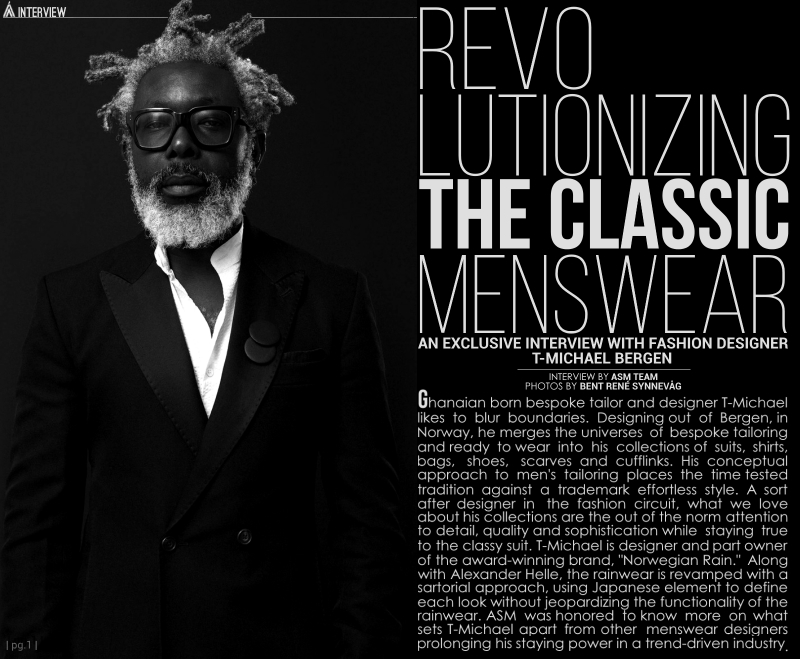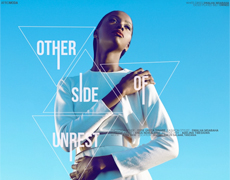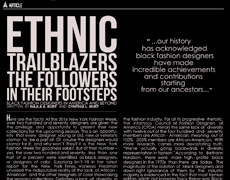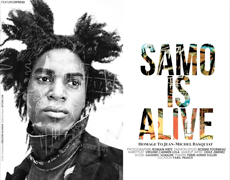ASM: We have to tell you that your style is amazing and you are an inspiration to us. You have a refined style that one does not see every day here in the United States – especially from the West Coast. Let us start off from the beginning by asking what it was like coming from Ghana that inspired and got you to study refined tailoring?
T-MICHAEL: It started at an early age. As a kid going to church, I wanted to look good meeting people and it felt good. As you grow, you realize that the way you look dictates the way the people approach and engage with you. So that in turn makes you want to find a style that reflects you. Having figured out what works for you and what does not; you therefore make changes where necessary and this in turn becomes a reflection of yourself eventually. When you get that right that is when it becomes your style. One gets drawn to well-made clothing and the gentleness around it. The tailoring came later because I realized that I could actually do that for a living making it my livelihood. It is a little difficult to pinpoint but I found myself drawn to clothing or when I started wondering why a designer does certain things to his or her collection –I wanted to find out more.
ASM: Can you describe the process of moving from the attraction to well-made clothing to the attention to detail? You are more of a progressive revolutionary designer. Your collections are not only beautifully made; but also they seem to be pushing the boundaries of what has come before.
T-MICHAEL: I used to go to stores and pick up clothes and as you said, they are beautifully made but they did not reflect what I stood for. They were the suits and shirts my dad would wear. So you change things around, putting on or mixing it with something else and then adding more of a contrast stitch to make it a little bit more inviting because there is something inside you that wants to bring out the revolutionary bit but in a subdued sort of way. I like tradition; I think that it is fantastic but I do not like conservatism because I feel that it stifles everything. There is just that balance between taking what has been and moving it a little bit forward. Ever so slightly enhancing it and adding my fingerprint to it. We should not be judged by how clean cut ones hair is or how trendy one is. I think we should be judged on how we carry ourselves and how one engages with other people. I think that is what a gentleman is all about. It is not about whether or not one has the right cufflink and the right shirt. I like the traditional part of a look and I like to move and shake things up a little bit but not too much. I do not want to rock the boat too much; just enough to create a balance. Nudging things into the right direction that is all.
ASM: Is there a time when you did not see that?
HS: Well, yes but that was before I went to Africa. It is now almost twenty years ago since I first traveled there. One of the strange things for me was like destiny. On my first trip into Africa I arrived directly into a civil war without wanting to. I was in the Congo at the moment the war broke out that I could not at that time have foreseen the rebellion of the Congo when the dictator Mobutu was overthrown and the new dictator Kabila took over; now Kabila’s son is running the Congo. Basically 1997 was the big deal where the whole power shift in Central Africa started to pivot and I happened to be there with my girlfriend. We were stuck and could not get out, and I shot this movie which was traumatizing. You have to have a very good day to see it. The thing is that I did not just show the genocide, because many people do that. What I did was basically show as a filmmaker, the fear, the confusion and the anger that you have witnessing such a thing. In all my films, I think the most important thing is not what you see as the movie but what is behind it. When you see a movie like this you can be with the person who films it. You can understand that this person is interacting with the people in a very direct way; and not like the BBC, CNN or newscasters who have a short time to break the news and do not have time to interact with people. They need a story that has simple factual reporting.
ASM: You mentioned having to break from the traditional or what is perceived to be the traditional or academic judgment of the right way of creativity. Where did that spirit come from? Is it something that has been within you? Where did that rebellious streak of fire come from?
T-MICHAEL: Umm, I am not sure but I have always questioned how things are supposed to be. Usually there is never an answer to my question and that becomes a green light for me to change it.
ASM: That sounds like you are motivated by common sense, an in genuine sensibility. With your clothing line, does the idea of function come first or does the idea come first in your mind as a beautiful form and then you try to make it work?
T-MICHAEL: It depends on what we are working on but with the Norwegian Rain line, the parameters are set in a way. We make garments that are one hundred percent waterproof and that is based on the fact that we live in a city where it rains two out of three days a week. Due to that, your stylistic preferences are arrested when it rains and so the concern is how we can create a garment that one can wear on a daily basis; so when it is raining, you just put up your hood. It is what we call Japanese sensibility. We make sure the color, proportions and balance are right. Function is very important from the Norwegian Rain point of view. However, we do not just want to focus on just functionality. We play around with it and bring out a little bit of what we stand for as well. We take away the zippers because they are too technical and replace them with horn buttons because they give the garments the sartorial heritage that I stand for and also allow more air to circulate. It is a little bit of engineering as we build them from scratch but we end up beautifying and enhancing them.
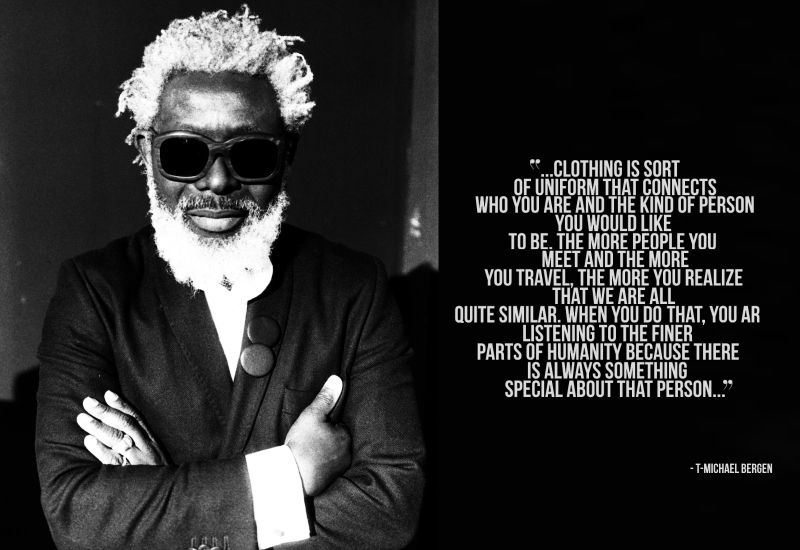
ASM: How about the T-Michael Line? Do you go through the same process or a different angle?
T-MICHAEL: The T-Michael line is totally different. I create looks that are based on what I want to wear myself. I simplify the design process by thinking about how I would like to wear a shirt or a pair of trousers. It is about how I prefer to wear and style my suits. It is about the balance between fine tailoring and an everyday uniform. It is just that balance of feeling stylish and looking practical but it is not too delicate.
ASM: If you could describe yourself aesthetic, breaking it down for us, what would you say it is?
T-MICHAEL: That is a little difficult. I tend not to dress up because what I wear everyday is what I wear every day. I do not have to tone it down or style it up for any occasion. For me, clothing is sort of a uniform that connects who you are and the kind of person you would like to be. I do not wake up thinking that I have to look my best. I would like to believe that I strive to look my best every day. That is what makes us gentlemanly. My style is not one I just put on; it is a style that I continue to evolve. It reflects my inner thoughts, my outlook on life and my love for all things well made.
ASM: So it is kind of an organic evolution?
T-MICHAEL: Yes, it is. I think culture and every aspect of our interaction with others– from fashion, music to art and the way we are should evolve. We should not stick to just one idea because it was the best idea in the past. We should strive to enhance all that is around us…always.
ASM: This is a more controversial question. You are clearly a man of the world moving from Ghana to Norway to Asia operating internationally. There is a lot of talk of immigration in Europe and further West on the tensions running with regards to cultures coming together. You seem to be an inspiration in bringing together cultures of the past with that of the present and future. What is your perspective on this being someone that has moved around the world and is inspired by different cultures? Has it affected you in a positive way?
T-MICHAEL: I think the more people you meet and the more you travel, the more you realize that we are all quite similar. It gets to a point that you break people down to individuals and not to people of a certain country or race. When you do that, you are listening to the finer parts of humanity because there is always something special about a person. For me, it has always been a one on one kind of interaction because I am engaging with that person; for that person has made it possible for us to engage together.
ASM: In the African Fashion industry, there are a good number of talented designers who are yet to get the internationally recognition in comparison to a number of other Non-African fashion designers. As an African yourself, what do you think needs to be done in order to elevate the notoriety of these talented designers to the top of the fashion industry on a global scale?
T-MICHAEL: There are different ways of addressing that. For starters, I think even though one does not read or hear about these talented designers, it does not mean they do not exist. There are thousands of designers from Africa and around the globe that are doing their best to bring that fire within them out in to their products. It does help to have the support of people to help put it out in front of the consumers to move it forward. Some of these designers have their market and some of them might be already self-dependent. At the same time, I believe that write ups or an editorial feature are not most instrumental in honing ones skill; although it helps to be recognized. However, continuously working on collections out of one’s basement, home or studio for years until it somehow comes out is one way to go. The focus is usually on the United Kingdom, Europe and Japan although Africa has been on the radar lately. I suppose this will increase in the years to come. Having said that, Africa does not need Europe or anywhere else for that matter, to get its designers working and churning out great work. The continent is big enough and could easily self-sustain its designers. I believe in time, things will change. We just need to keep supporting each other. I meet a lot of designers from around the world and we support each other. Just by talking about it lightens up the mood and gets us all eager to want to do some more work. It is kind of difficult to present a panacea on how to be to be visible; but the best thing is just to continuously do the best one can and join forces with others. The more you think outside the box, the better you get; and not just recreating the obvious but being conceptual and original.
ASM: What can we look forward to from you? Are there any projects we should lookout for?
T-MICHAEL: There is always something new on the horizon. It is what makes me and most creative people tick At least it does with me anyway. Once I finish a project, I move on to the next one. I am just as curious as you are. So I would say, watch this space.

